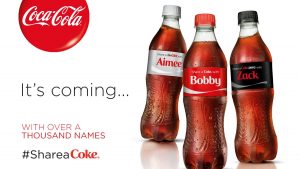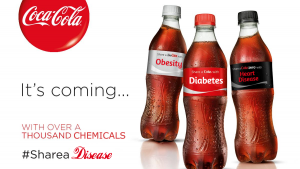
Coca-Cola’s Share a Coke Campaign
The ad I chose to manipulate is the poster for the Coca-cola “Share a Coke” campaign. While it may seem like a harmless advertisement at first glance, a closer analysis reveals several underlying issues. First, Coca-cola is a major corporation whose aim is to make a profit, even if it is through questionable ethical practices. In order to lower costs, many food corporations include harmful chemicals in their products. Coca-cola, for example, adds a chemical called E952, a sugar substitute that is two hundred times sweeter than regular sugar and can cause a myriad of health issues. These companies understand these health risks but choose to downplay them and instead continue to market their product to children, seniors and other vulnerable populations. It is problematic that our society has become so hyper-capitalistic that people’s health is an accepted trade-off to make money.
The advertisement also tries to sell its products by exploiting human behaviours and desires. The slogan, “Share a Coke with…” taps into the innate desire for humans, as social creatures, to have relationships and spend time with other people. By manipulating people to associate this sentiment with its product, the Coca-Cola corporation is able to convince people that consuming a chemical-filled, health-damaging beverage is somehow good and favourable. What’s more, we as consumers allow it. Not only is our society hyper-capitalistic, but hyper-consumerist as well, where people have become so obsessed with spending that they are blithely unaware of how the products they are spending on might be harming their bodies. While such concepts have been researched time and time again in academia, the truth is that these advertisements still work. It is a continuous vicious cycle where, almost always, the big corporations have the upper hand.

Jammed Advertisement
For my “jammed” advertisement, I decided to highlight the issues of hyper-capitalism and how it relates to people’s health issues. I wanted to maintain the simplicity of the ad, but change certain key details that would make the audience have to think twice. Cluttering the ad with too many other images or words, I thought, would take away from the advertisement’s effectiveness. In the bottom left corner, I changed the phrase “with over a thousand names” to “with over a thousand chemicals”, thus exposing the sheer amount of artificial substances we consume in each bottle. Additionally, the slogan, #ShareaCoke, is altered to #ShareaDisease. I wanted people to realize the fact that large corporations regularly manipulate human emotions and behaviours as a sales strategy to profit.
Not only that, but consumers unknowingly aid the corporations as well by promoting their products to friends and families. I wanted to strip away all the fluff from the campaign’s slogan and expose the harsh reality that corporations try so hard to hide: sharing a Coke is equivalent to sharing the possibility of disease. Consumers need to understand how disturbing it is that they willingly give their children and other loved one’s products that contain explicitly harmful substances, solely based on how something is marketed. It is considered outrageous to give children cigarettes for all its harmful chemicals, but somehow, because of the exploitative advertising, Coke is deemed acceptable. In order to add extra emphasis to this idea, I replaced the names of the people on the Coke bottle labels to the names of diseases one could suffer from. It is interesting to think about how unpopular Coke would become if consumers were really informed of the health risks. Through this assignment, I hope that consumers become better aware of the exploitative measures that big corporations use, and that they take a moment to reflect on how the products they so regularly consume may be damaging to their health.